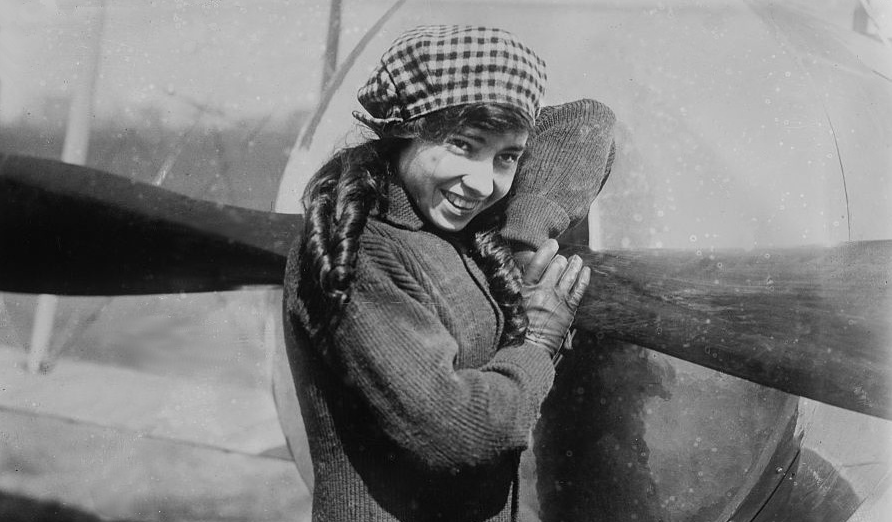
Katherine: women flying for freedom
James Fleck & Carla Pavei: Anticancerweb 17(03), 2019
Around 15 to 20% of breast cancer patients are classified as Her2 positive. Trastuzumab is an anti-Her2 monoclonal antibody, which interferes with receptor dimerization, disrupting MAPK and PI3K/AKT signaling transduction pathway. Trastuzumab emtansine (TDM1) consists of the anti-Her2 monoclonal antibody conjugated to a cytotoxic agent (DM1). TDM1 conjugate is internalized in the tumor cell through Her2 receptor, where the drug is metabolized. The cytotoxic component binds to tubulin, blocking mitosis and causing tumor cell death. Pharmacodynamic differences between trastuzumab and TDM1 generated a non-cross-resistance alternative hypothesis in adjuvant treatment of Her2 breast cancer patients.
Neoadjuvant treatment of Her2 positive breast cancer rely on preoperative administration of chemotherapy + anti-Her2 therapy (trastuzumab) for a period of six cycles. A complete pathological response is observed in 40 to 60% of the cases, anticipating a better prognosis. Nevertheless, almost half of the patients persists with breast or lymph node residual disease, accounting for a worse prognosis. Hypothetically, patients with Her2 positive breast cancer presenting residual disease after neoadjuvant treatment could be rescued with the TDM1 conjugate.
In February 2019, the German Breast Group published in the New England Journal of Medicine an interim analysis of the Katherine Trial. It is a prospective randomized phase III study, including women with Her-2 positive breast cancer, T1 to T4 and N0 to N3, who had residual disease after neoadjuvant treatment. In the control arm the patients continued to receive trastuzumab, while in the test arm the treatment was converted to TDM1. In both arms the therapy was considered as adjuvant and the duration was of 14 additional cycles. The primary outcome was invasion-free survival and included absence of homolateral recurrence in breast tissue and lymph nodes, absence of invasive contralateral breast cancer, metastatic disease, and death for any reason. After a median follow-up of 40-months, the study showed that adjuvant TDM1 reduced the risk of recurrence of invasive breast cancer or death by 50% as compared to the continued use of adjuvant trastuzumab. The incidence of invasive disease was 12.2% in patients who used TDM-1, compared to 22.2% in the arm with trastuzumab. In addition, the percentage of patients alive at 3 years was 88.3% versus 77%, respectively, in the test arm and control arm (HR 0.50 P <0.001). The rates of distant recurrence were also lower in the group that received TDM1 (10.9%) versus trastuzumab (15.9%). However, there was no difference in CNS metastasis, which deserves special attention. There was greater toxicity with MDD1, especially thrombocytopenia, hypertension, hepatic toxicity and neuropathy. Adverse events leading to discontinuation of treatment were more frequent in the TDM1 group (18%) than in the trastuzumab group (2.1%). Although based on a surrogate, the magnitude of the difference favors a new therapeutic standard.
Special recognition should be given to women who participated in the Katherine Trial. Being accrued for a curative intent treatment, this group of women recognized the scientific rationale and embarked on a clinical trial looking for personal but also collective benefit. They were flying to be invasive disease-free. They were flying for freedom, following the same inspiration as Katherine Stinson, whose courage and determination made her one of the first women allowed to fly in the United States. The license was issued in 1912. Very early in life, Katherine overcame a pulmonary tuberculosis and continued to fly, breaking records and actively participating in humanitarian causes until her death in 1977, at the age of 86. Since the beginning of the 21st century she became part of the International Air & Space Hall of Fame. The example of Katherine Stinson is shared by each of the women who joined the Katherine Trial.
Reference:
G. von Minckwitz, C.-S. Huang, M.S. Mano, et al: Trastuzumab Emtansine for Residual Invasive HER2-Positive Breast Cancer, N Engl J Med380:617-28, 2019
Debra L. Winegarten: Katherine Stinson: The Flying Schoolgirl, Eakin Press, Austin, TX, 2000

Please login to write your comment.
If you do not have an account at Anticancerweb Portal, register now.